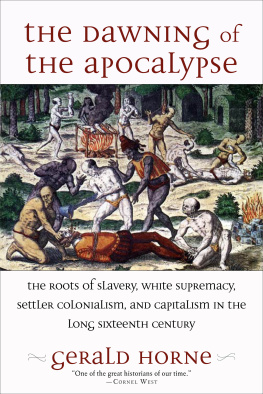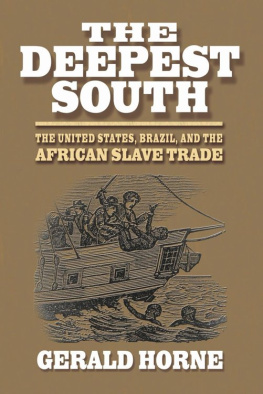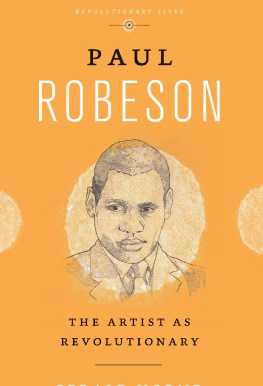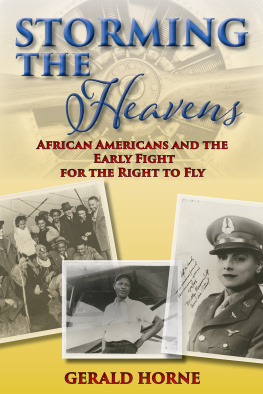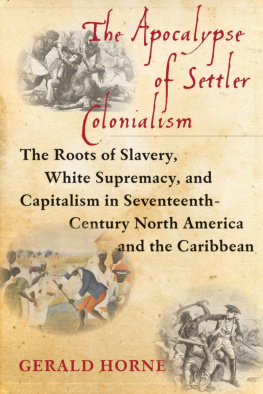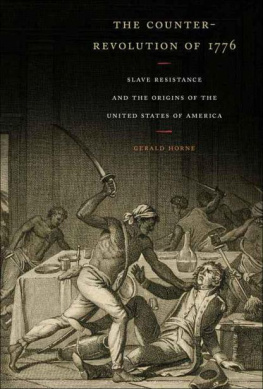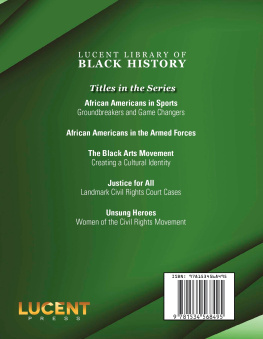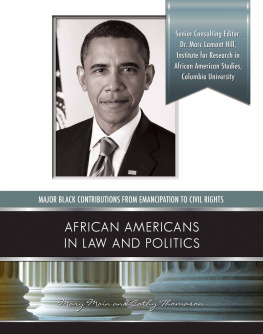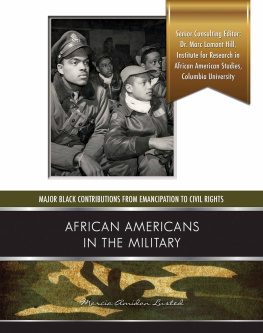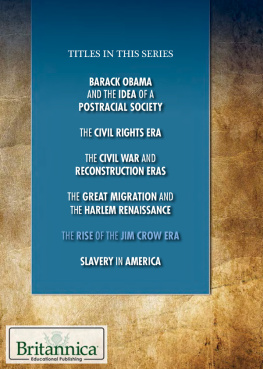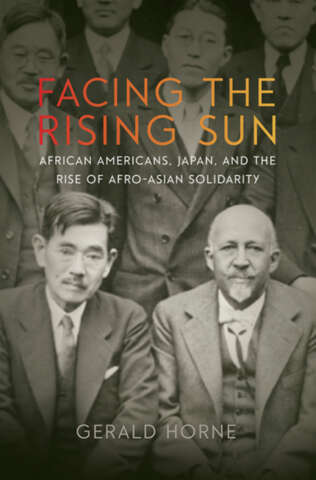
Facing the Rising Sun
Facing the Rising Sun
African Americans, Japan, and the Rise of Afro-Asian Solidarity
Gerald Horne

NEW YORK UNIVERSITY PRESS
New York
NEW YORK UNIVERSITY PRESS
New York
www.nyupress.org
2018 by New York University
All rights reserved
References to Internet websites (URLs) were accurate at the time of writing. Neither the author nor New York University Press is responsible for URLs that may have expired or changed since the manuscript was prepared.
ISBN : 978-1-4798-4859-1
For Library of Congress Cataloging-in-Publication data, please contact the Library of Congress.
New York University Press books are printed on acid-free paper, and their binding materials are chosen for strength and durability. We strive to use environmentally responsible suppliers and materials to the greatest extent possible in publishing our books.
Manufactured in the United States of America
10 9 8 7 6 5 4 3 2 1
Also available as an ebook
Contents
The man who would become Malcolm X was dissembling.
He was in Manhattan during World War II and was being interrogated by the authorities about the possibility of being conscripted by the military, a prospect he surely wanted to avoid. He knew that Army intelligence in Harlem was quite sensitive about the possibility of inadvertently drafting pro-Tokyo Negroes. So, he said, I started noising around that I was frantic to join the Japanese Army. Yes, he enthused, I want to get sent down South. Organize them nigger soldiers, you dig? Steal us some guns, and kill up crackers! At that point the psychiatrists blue pencil dropped and his professional manner fell off in all directions.
His dissembling had to be taken seriously for at least two reasons: in preceding decades, Japan had made aggressive overtures to win over the beleaguered U.S. Negro community and the Japanese military had made startling advances in the Asia-Pacific theater. Moreover, Malcolm Little was hardly singular in his reluctance to join the war-torn military. By late 1943, African Americans accounted for a whopping 35 percent of the nations delinquent registrants, and between 1941 and 1946, thousands of Black men were imprisoned for not complying with the Selective Service Act.
It may have been asking too much to expect persecuted U.S. Negroes to unquestioningly throw in their lot with the nation that had pulverized them. In short, pro-Tokyo sentiment was perceived as widespread among U.S. Negroes; this perception was propelled by guilty fear that this oppressed group would seize the moment of war for retribution and retaliation. Even the staid NAACP leader Walter White felt constrained to deny the astounding and disturbing statement that actual proof was available to support the fact that the NAACP was receiving considerable subsidy from the Japanese government.
Walter Karig, who had made the initial inquiry about Tokyo-NAACP ties that White was forced to deny, provided a tepid affirmation: I have no knowledge that the NAACP is receiving substantial or any other kind of subsidy from the Japanese, he wrote.
Disturbing events in Illinois would have confirmed his most febrile fears. It was on or about 7 December 1941 when Willie Pretty Stockyard Cole rushed through the front door of Nelson Sykess Brass Rail Saloon at 329 East 47th Street in Chicago, yelling frantically, The colored folks have bombed Pearl Harbor! The colored folks have bombed Pearl Harbor! In reply an inebriated Broke Hunter, standing at the end of the bar, interrupted Willies screaming with his own, shouting, I know the white folks are going to give me a steady job now. He was interrupted in turn by Fat Clark proclaiming, Amen.... I recall my father tellin me how much overtime money colored people made during the last big war. The more elevated Dempsey Travis, in assessing these excited responses, calmly declared that some Blacks experienced a vicarious pleasure from the thought that Charlie was getting his ass kicked by some colored people. He recollected that in South Chicago there was a group known as the Moors who were actually pro-Japaneseand they were hardly alone.
The attitude glimpsed by Travis was not unique. In January 1942 a meeting of U.S. Negro leaders voted 365, with 15 abstaining, that their community was not 100 percent behind the war against Japan. A 1942 poll found that 18 percent of Black New Yorkers said they would be better off under the Japanese; an additional 31 percent declared that their treatment would be the same; and only 28 percent said it would be worse.
The young Brooklyn pianist Randy Weston recalled later that after the bombing of Pearl Harbor, the Americansmeaning Euro-Americans in the United Stateswere so shook up they panicked, and since they
In Washington, D.C., Elmer Carroll was judged to be a draft dodger after war erupted. Carroll, according to a journalist, said he was a brother to the Japs and refused to fight against them, despite authorities efforts to convince him that the Moslems (the religious grouping to which he presumably belonged) were a fighting people and had been so for thousands of years, and thus he should have no hesitation to join the U.S. military.
***
W. E. B. Du Bois, Booker T. Washington, and other Negro leaders may have had conflicts among themselves, but all looked to Tokyo as evidence that modernity was not solely the province of those of European descent and that the very predicates of white supremacy were senseless. However, what was striking about pro-Tokyo sentiment among African Americans was that it cut sharply across class lines: it was prevalent in the intellectual salons of Harlem, the plants of East St. Louis, and the fields of the Missouri boot-heel, stretching south into Arkansas and Mississippi.
Booker T. Washington expressed a view shared widely among U.S. Negro leaders when he told a Japanese journalist in 1912,
Speaking for the masses of my own race in this country I think I am safe in saying that there is no other race outside of America whose fortunes the Negro peoples of this country have followed with greater interest or admiration.... In no other part of the world have the Japanese people a larger number of admirers and well-wishers than among the black people of the United States.
Besieged African Americans felt the need to look abroad for succor and support, following the sage advice of Du Bois and Washington alike. On 2 July 1917 gangs of Euro-American men roamed through East St. Louis and systematically beat, shot, hanged, and immolated African Americans. Soon East St. Louis was to become the de facto capital of pro-Tokyo sentiment in the United States, and those with past ties to Garvey served as chief lieutenants.
In short, Tokyo catered to U.S. Negroes, knowing well how Jim Crow had wounded them. Reportedly, it was during the early 1920s that the Foreign Ministry in Tokyo ordered that all captains of oceangoing Japanese passenger ships afford African Americans preference in every way connected with their travel.
Negroes accustomed to Jim Crow penalties, especially and onerously when traveling, were justifiably impressed by this turn of events.
Sensing the direction of political winds, the U.S. military aviation strategist William Billy Mitchell wrote in confidential terms of the Pacific Problem. The policy of the United States and in fact of all the white countries having their shores washed by the waters of the Pacific Ocean, is to keep their soil, their institutions and their manner of living free from the ownership, the domination and the customs of the Orientals. For eventually in their search for existence the white and yellow races will be brought into armed conflict to determine which shall prevail. Thus, he continued menacingly, we are faced with a problem much greater than it appears on the surface, that of maintaining not only the political supremacy but also the very existence of the white race. The rumblings of this coming strife, he concluded, have ceased to be inaudible whispers but are the loud protests of the Japanese people, the vanguard of the Asiatics, over the exclusion laws, the land laws and their unequal treatment at the hands of our citizens.
Next page

